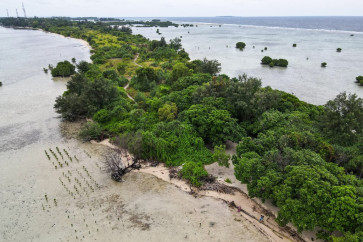B20 recommendations expected to drive global growth, create jobs
Global businesses put forward on Friday recommendations to leaders of the worldâs 20 largest economies â including speeding up the implementation of the âBali packageâ struck last year â which are expected to drive global growth and create jobs amid a bleak worldwide economy
Change Size

G
lobal businesses put forward on Friday recommendations to leaders of the world's 20 largest economies ' including speeding up the implementation of the 'Bali package' struck last year ' which are expected to drive global growth and create jobs amid a bleak worldwide economy.
The 'Bali package', which includes a 'trade facilitation agreement', was agreed by 160 members of the World Trade Organization (WTO) last year to streamline the flow of goods worldwide.
The recommendations were made by the B20 ' businesspeople from the world's 20 largest economies ' following two days of deliberations to bridge the differences between the nations, in conjunction with the G20 trade ministers meeting in Sydney, Australia.
The 20-point blueprint focuses primarily on promoting structural flexibility, free movement across borders, consistent and effective regulations, and integrity and credibility in commerce. The themes are expected to be discussed when the G20 leaders meet for a high-profile summit in Brisbane in November.
B20 chair Richard Goyder emphasized during the business summit's closing ceremony that governments of the G20 member countries ' which represent 80 percent of global gross domestic product (GDP) ' needed to encourage businesses to start investing again, especially after the financial crisis in 2008.
'Private sector investment is a prerequisite to reaching sustained and inclusive economic growth,' he said in front of attendees, including Australian Treasurer Joe B. Hockey and Australian Trade and Investment Minister Andrew Robb.
The way to realize that, he added, was to undergo structural reforms that would eventually remove barriers.
Responding to Goyder's comments, Hockey acknowledged the importance of partnerships between the governments and the private sector.
'We need your money,' he said jokingly in his remarks, adding that the governments did not have enough funds to build the necessary infrastructure to drive growth on their own.
WTO director general Roberto Azevedo said during one of the summit's discussions that the trade facilitation agreement was not the only thing that needed immediate realization, despite being the one topic that has been criticized for slow implementation after the deal was struck last December.
Azevedo cited agriculture and least-developed countries (LDCs) as part of the 'Bali package' deal that also needed to be implemented soon. 'All of them need implementation,' he added.
Meanwhile, the B20 also called on each nation to publish and deliver credible national infrastructure pipelines that had been rigorously assessed and prioritized by independent infrastructure authorities, while taking full advantage of private sector finance and expertise.
The National Development Planning Board (Bappenas) has estimated the need for US$550 billion in funding between 2015 and 2019 to resolve Indonesia's current infrastructure crisis, which has hampered the country from growing at an optimal rate. More than half the required investment would need to be funded by the private sector or through public-private partnerships (PPPs).
Another point emphasized in the B20 blueprint is the need for financing instruments that better align risks and returns in long-term investments, including in the infrastructure sector.
Contacted separately, Erwin Aksa, CEO of Indonesian conglomerate the Bosowa Group, said that the recommendations were 'realistic enough' to be carried out across the archipelago.
He said the Indonesian government should take into account all business factors before offering infrastructure projects to the private sector.
'So many projects are on offer now, but investors must take care of all arising matters by themselves. Many of the investors are then reluctant to proceed,' he said in a text message.
Meanwhile, according to Budi Gunadi Sadikin, president director of Indonesia's largest lender, Bank Mandiri, financial institutions needed to develop other financing instruments for long-term infrastructure projects.
Otherwise, he said, banks would have a hard time financing the projects using short-term funding, citing timeframe mismatches.








![A man walks across a pedestrian crossing near a billboard depicting named Iranian ballistic missiles in service, with text in Arabic reading “the honest [person's] promise“ and in Persian “Israel is weaker than a spider's web“, in Valiasr Square in central Tehran on April 15, 2024. Iran on April 14 urged Israel not to retaliate militarily to an unprecedented attack overnight, which Tehran presented as a justified response to a deadly strike on its consulate building in Damascus.](https://img.jakpost.net/c/2024/04/16/2024_04_16_149344_1713260233._medium.jpg)
